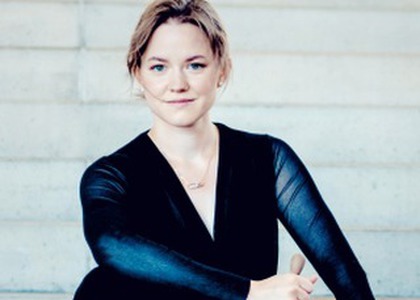> [Archived] Interviews

Interview with conductor Katharina Wincor
On Friday, January 19th, the radio music season continues with a highly anticipated concert by the National Radio Orchestra, under the baton of conductor Katharina Wincor for the first time. On this occasion, the Austrian musician had a conversation with our colleague, Ioana Țintea.
Katharina Wincor, on Friday, January 19th, you will be the conductor of the National Radio Orchestra for the first time. Do you remember what you thought when the invitation to come to Bucharest was extended to you?
I received the invitation several months ago. During this period, I have conducted several orchestras in different countries. It's always interesting when I stand in front of an ensemble I haven't worked with before. Initially, I am a bit unsure of how it will be because the musicians are different too. For example, in some countries, the artists are punctual and everything goes very well, while in other places, everything is better prepared and organized. It's interesting to go through such experiences.
How do the rehearsals go, and what do you appreciate the most about the musicians of the ensemble?
What's wonderful about rehearsals is that we have a lot of interaction. Some orchestras just do what they are told and don't ask anything. But when musicians want to present an idea, it brings me a lot of joy. I greatly appreciate their pleasure in playing... of course, there are small mistakes at times, but they are extremely musical, which is wonderful!
You will conduct Symphony No. 39, one of Mozart's last three symphonies, and the famous Concerto No. 5 in E-flat major for piano and orchestra, "Emperor" by Beethoven. At first glance, the two works only share the Classical period to which they belong. Is there another idea that unites them? How did you think about the composition of the program?
From several perspectives, I believe this pairing works well. The styles are not similar, but indeed, the period to which they belong is the same. Another aspect that connects them is the tonality. Both are written in E-flat major, which gives the program a unity in terms of sound. Mozart's symphony is quite special because it has an imposing beginning but lacks a real ending. When we refer to Mozart's last three symphonies, we see them as one entity, and the one we will perform is considered the first in the series of three - I see it as just a beginning. It concludes as if the composer forgot to write the ending. That's why I chose to open the program with this piece. On the other hand, Beethoven's "Emperor" has an imposing ending, so I believe it fits well and creates a wonderful atmosphere.
What are your expectations regarding the collaboration with pianist Mihai Ritivoiu?
I haven't met the pianist yet. I am always eager to meet new people and soloists I haven't worked with before. I am quite young, so I haven't had the opportunity to collaborate with many artists until now. But he, too, is young, and I think it will be great. Both of us have some experience with this concert, but not for decades, and that will bring a freshness to the interpretation.
Translated by Ana-Maria Ramona Ionescu,
University of Bucharest, Faculty of Foreign Languages and Literatures, MTTLC, year I
Corrected by Silvia Petrescu














